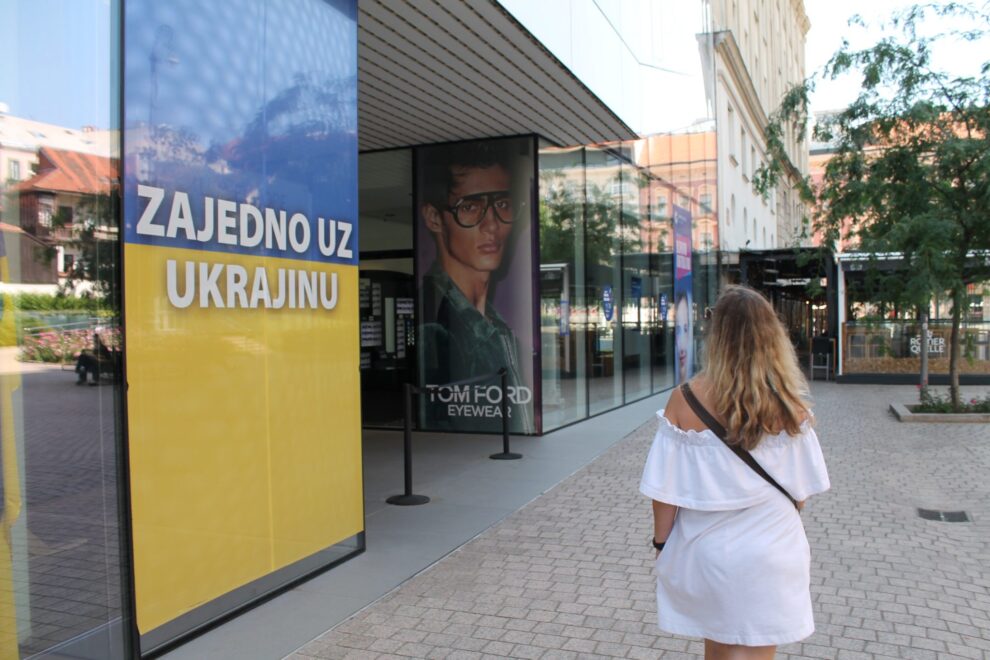Thousands of Ukrainians fleeing war have been warmly received in Croatia by those with still-fresh memories of conflict and flight, but language barriers and red tape mean the task of rebuilding their lives is more difficult.
Viktoria has only good words to say about her stay in Croatia since fleeing Ukraine.
The 44-year-old IT worker and her daughter left Kyiv as soon as Russian tanks began rolling towards the Ukrainian capital in February 2022, first finding refuge in the small northern coastal town of Fazana where Ukrainian friends owned a holiday home.
The two were among some 4.8 million refugees who had fled Ukraine by the end of 2022.
When the Croatian tourist season began, Viktoria and her daughter moved to the other end of the country, to Osijek near the border with Serbia where they state said they could provide them with accommodation. Her mother joined them after Russian forces occupied her village near Kyiv. Viktoria’s 24-year-old son is in Spain.
Viktoria, who has continued her work online, said she had seen great generosity since arriving and did not hesitate in saying she would stay.
“People brought us aid packages and left them in front of the door when we weren’t home,” she told BIRN, speaking on condition her full name not be used. “They helped with open hearts.”
Just over 11,000 Ukrainians arrived in Croatia in 2022; by mid-August this year, a further 22,357 had made the trip, the largest number [5,069] settling in the capital, Zagreb, following by the coastal Split-Dalmatia County [4,325], and the northern region of Primorje-Gorski Kotar around the port of Rijeka [2,636].
Such an influx stands in stark contrast to decades of emigration by Croats that has resulted in a worrying demographic crisis. But language barriers, employment opportunities, and costly red tape around the recognition of qualifications has made it harder for some. Educated Ukrainians won’t stay if they have to work for Glovo or Uber forever, said Viktor Filima, a representative of the Ukrainian National Minority of Zagreb.
“These are people who had a life in Ukraine, who owned and built something,” he said. “A prerequisite for staying is some kind of system that will enable them to do so here as well.”
‘They understand us’
Like Viktoria, Olena and her husband and two daughters ended up in Osijek, though she didn’t think she would stay for more than a few weeks.
“We decided to come to Croatia at the invitation of a friend, but we thought it would only be for one month,” said Olena, a 42-year-old teacher from the Black Sea port city of Mykolaiv, which has been heavily bombed by Russia.
“We came by evacuation trains, without suitcases, only with documents. Many people selflessly helped us, but the most important thing is that it was peaceful here and we felt safe and accepted,” she said, also asking that her surname not be published.
Olena’s mother and 84-year-old grandmother joined them; Olena’s husband, a ship mechanic, found a job in a company that builds and maintains river facilities, while Olena has volunteered for the Red Cross, helping her to learn Croatian through everyday contact with the language.
The family is housed in a hostel provided by the state.
But for all the support they have received, starting a new life elsewhere has been a wrench for Olena and her husband, who say they are not yet thinking about whether to make the move permanent.
“In these conditions, it looks very difficult,” Olena told BIRN. “The Croatian state helps as much as it can; we are grateful for all the help and the welcome.”
Their children, however, are already settled. “My children told me that they like Croatia and Croatian schools more and that they would not like to return,” said Olena.
“They are used to it here, they have a lot of friends at school and they don’t want to go back.”
This, she said, is a consequence of the support and empathy they have felt since arriving.
Oksana Martinjuk, who moved from Ukraine to Croatia more than two decades ago and works as a professor of Ukrainian and psychologist, said Croatia’s eastern Slavonia region, of which Osijek is part, had lived through war in the early 1990s when Yugoslavia fell apart. Slavonia, Baranja and western Srijem, all bordering Serbia, were cut off from the rest of the country and only reintegrated to central government control several years after the end of the 1991-95 war, when Croat refugees returned.
“People in Slavonia lived through what Ukrainians are living through now, and we know that they understand us,” said Martinjuk, who is now engaged in helping her compatriots cope in their new surroundings.
Employment ‘the biggest problem’
There are roughly 500-600 Ukrainians in Osijek-Baranja County, but numbers fluctuate and are hard to track, particularly since Croatia entered the borderless Schengen area on January 1.
In the major urban centres there are day centres for Ukrainians where they can meet, exchange information, seek legal help and counselling and organise workshops for children.
Croatia currently provides one-off aid of around 300 euros and pays for accommodation and related costs. However, it cannot offer the same kind of social support provided by the likes of Germany and other more affluent western European states, prompting many Ukrainians to head further west.
“Employment is the biggest problem, especially since we have a lot of highly educated people – doctors of science, professors, who are now doing whatever they have to,” said Martinjuk.“They also accept the jobs of housekeepers, waiters, they do what they can.”
Recognition of diplomas and language barriers can slow integration, but this is no obstacle for some. “We had a musician and a conductor who immediately found work in the orchestra of the Croatian National Theatre,” said Martinjuk.
Ukrainians are offered courses in Croatian, but Olena said there aren’t enough and they are too short.
“Courses were organised, but they are not standardised,” she told BIRN.“In Germany, 600 hours of language are taken for each level; we only had 70 hours. It helped, but although we learn quickly, we still make mistakes.”
Non-governmental organisations such as the Centre for Peace and Nonviolence and Human Rights in Osijek and Dkolektiv try to plug the gaps in terms of legal assistance, counselling, social events, but such activities are dependent on donor funds that could end at any moment.
“There were gatherings, sports events, workshops, lawyers came for legal help, people from the Employment Office, interaction took place every Saturday and that was welcome for everyone to get to know and expand the circle of people,” Olena said of the work of Dkolektiv.
Vancouver, Madrid, Dublin…
Filima, of the Ukrainian National Minority of Zagreb, said Ukrainians are also integrating well in the capital, having been welcome by Croatians “in a truly fantastic way”. But they are unlikely to stay if they cannot build the kind of lives they enjoyed in Ukraine, he said.
“If they see that they have no perspective here, they are already in Vancouver, Madrid or Dublin.”
According to Filima, more than a third of Ukrainians in Zagreb have completed higher education. “However,” he said, “that means nothing if he will work permanently as a taxi driver. In Germany, Poland, and other countries, the process of recognising diplomas has been accelerated.”
In Croatia, he said, the process can take between two and five years and just to start it costs some 1,300 euros. “That’s a lot of money for a person who came as a refugee.”
The main thing, said Filima, is “not to give them help, but to teach them how to manage on their own. Don’t give them fish, teach them to fish.”
Source : Balkan Insight






































